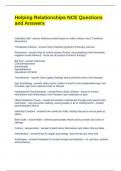-
1. Exam (elaborations) - Practice exam 1 (nce) questions ands answers 2023
-
2. Exam (elaborations) - Nce-practice exam questions and answers scored a+
-
3. Exam (elaborations) - Ncence-assessments and testing questions and answers 2023
-
4. Exam (elaborations) - Nce study guide question's and answers, graded a+ 2023
-
5. Exam (elaborations) - Nce study guide (rosenthal) questions with complete answers 2023
-
6. Exam (elaborations) - Nce prep areas of clinical focus questions and answers 100% verified
-
7. Exam (elaborations) - Nce practice test questions and answers 100% accurate
-
8. Exam (elaborations) - Nce practice test questions with solutions 2023
-
9. Exam (elaborations) - Nce practice questions and answers 100% correct
-
10. Exam (elaborations) - Nce practice exam questions and answers 100% verified 2023
-
11. Exam (elaborations) - Nce national counseling exam questions and answers, fully solved
-
12. Exam (elaborations) - Nce lpc exam study guide questions and answers, scored a+
-
13. Exam (elaborations) - Nce exam questions and answer, latest updated 2023
-
14. Exam (elaborations) - Nce exam lifestyle and career development questions and answers 100% correct
-
15. Exam (elaborations) - Nce exam 1 questions and answers 100% accurate 2023
-
16. Exam (elaborations) - Nce exam - research and program evaluation questions with rationale 2023
-
17. Exam (elaborations) - Nce exam - professional orientation and ethics questions with accurate answers 2023
-
18. Exam (elaborations) - Nce ethics questions with complete solutions 2023
-
19. Exam (elaborations) - Nce counseling skills and interventions (201) questions and answers, guaranteed a+
-
20. Exam (elaborations) - Nce- comprehensive key terms questions and answers, rated a+ 2023
-
21. Exam (elaborations) - Nce career counseling questions and answers 2023
-
22. Exam (elaborations) - Nce and cpce study guide questions and answers 100% correct 2023
-
23. Exam (elaborations) - Nce 2023 questions and answers, latest updated 2023
-
24. Exam (elaborations) - Nce 2023 exam questions with complete top solutions 2023
-
25. Exam (elaborations) - Nce - group counseling & group work - study questions and answers, graded a+ 2023
-
26. Exam (elaborations) - Assessment nce questions and answers 100% correct
-
27. Exam (elaborations) - Nce practice test questions with accurate answers
-
28. Exam (elaborations) - Nce-lpc exam study guide questions and answers 2024
-
29. Exam (elaborations) - Nce practice test questions and answers 100% solved
-
30. Exam (elaborations) - Nce exam 2024 study guide questions and answers fully solved
-
31. Exam (elaborations) - Nce practice test with explanations questions and answers graded a+
-
32. Exam (elaborations) - Nce practice questions and answers 100% solved
-
33. Exam (elaborations) - Nce study guide questions and answers 100% solved
-
34. Exam (elaborations) - Nce 2023-2024 questions and answers 100% correct
-
35. Exam (elaborations) - Nce study guide (rosenthal) questions with solutions 2024
-
36. Exam (elaborations) - Nce exam – appraisal questions and answers graded a+
-
37. Exam (elaborations) - Nce 2023-2024 questions and answers
-
38. Exam (elaborations) - Major theories & theorists – nce questions and answers 2024
-
39. Exam (elaborations) - Nce helping relationships practice questions and answers
-
40. Exam (elaborations) - Nce purple book questions (assessment and testing) questions and answers 100% solved
-
41. Exam (elaborations) - Nce prep quiz 1 questions and answers 2024
-
42. Exam (elaborations) - Nce - professional orientation & ethical practice - study questions and answers
-
43. Exam (elaborations) - Nce exam questions with solutions
-
44. Exam (elaborations) - Nce prep. areas of clinical focus questions and answers 2024
-
45. Exam (elaborations) - Nce questions and answers 100% solved
-
46. Exam (elaborations) - Helping relationships nce questions and answers
-
47. Exam (elaborations) - Nce. research methods and program evaluation questions and answers 2024
-
48. Exam (elaborations) - Nce practice test #2 questions and answers 2024
-
Show more




